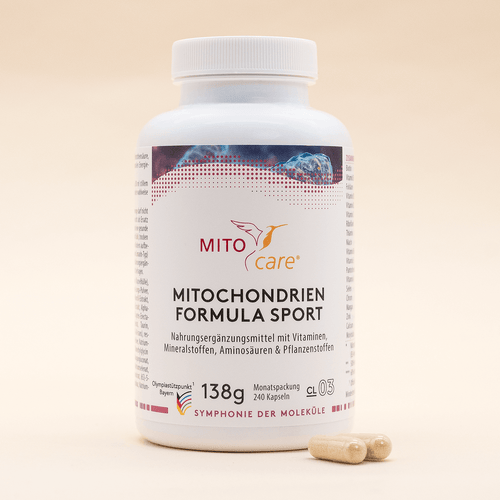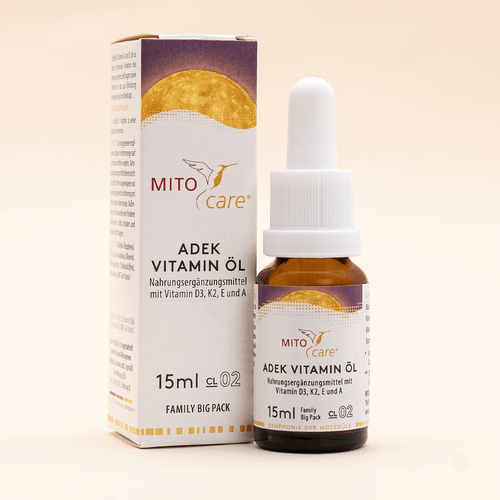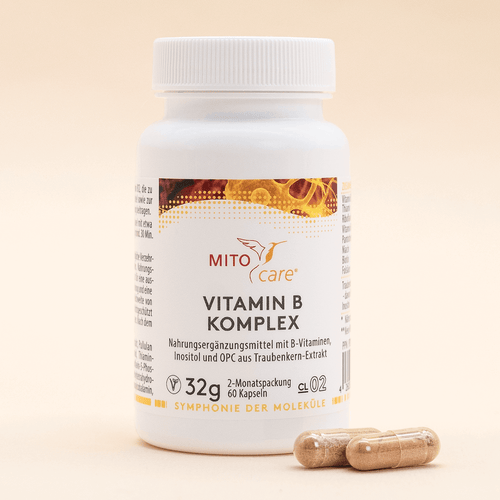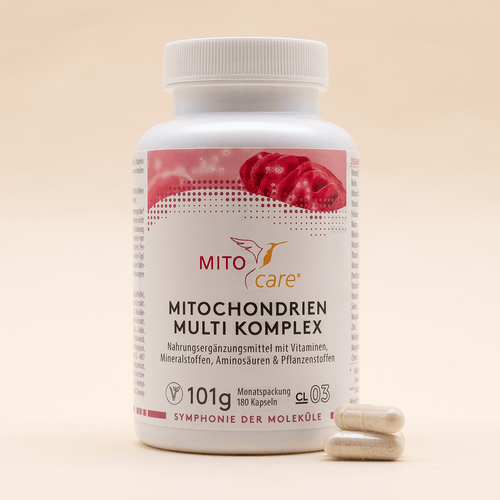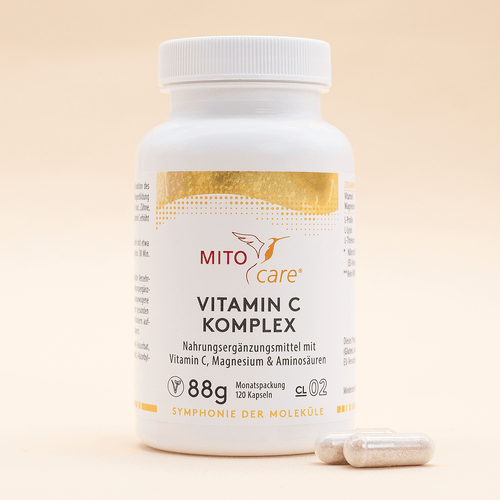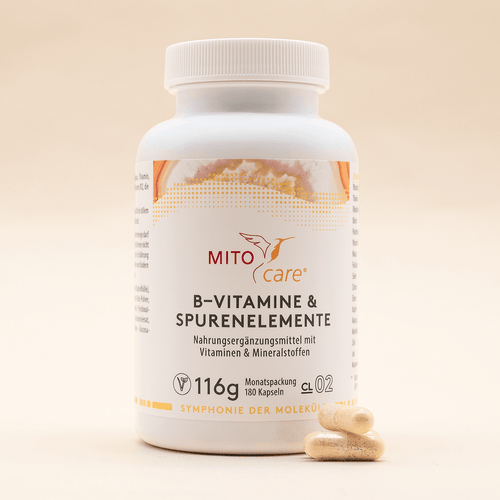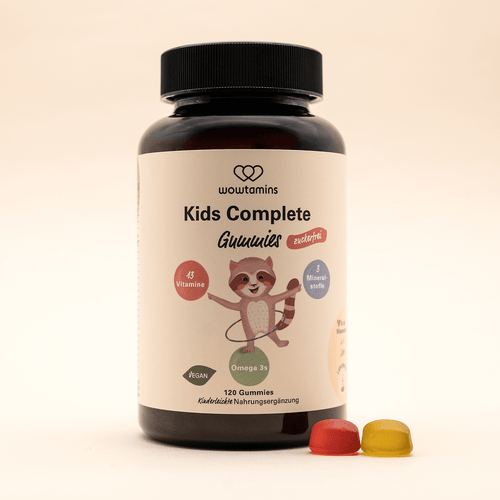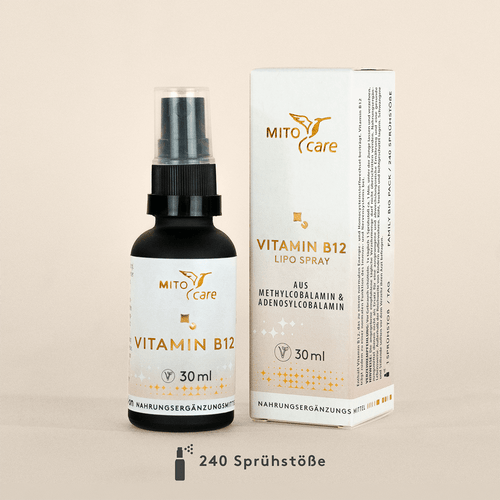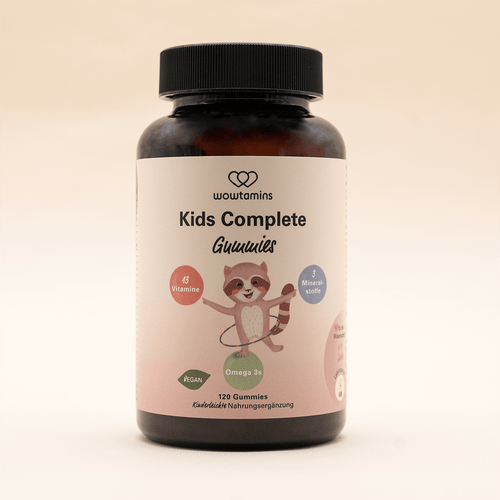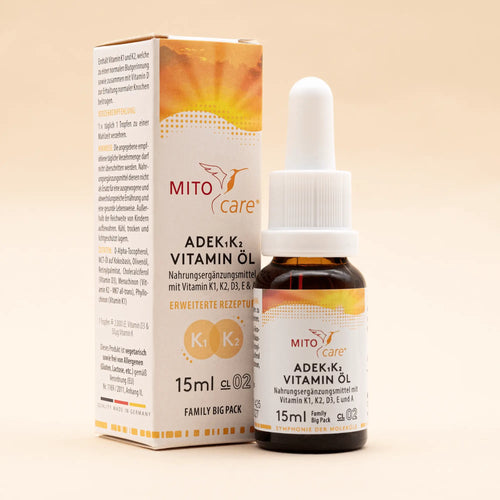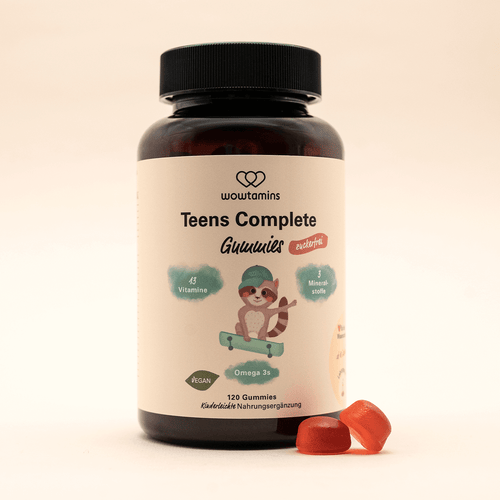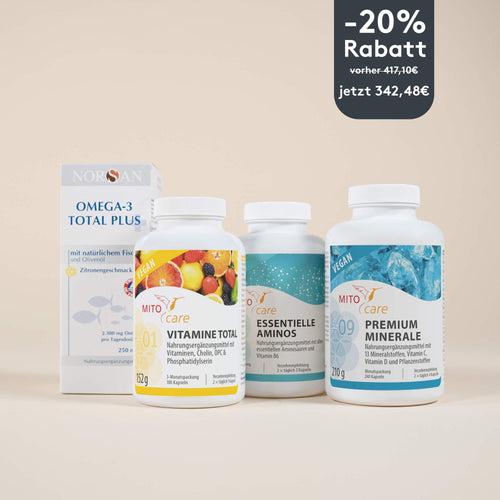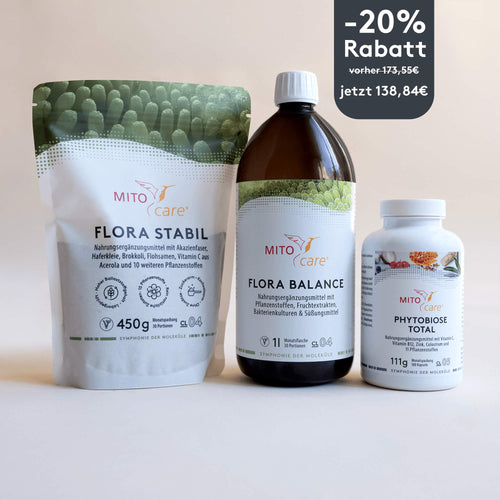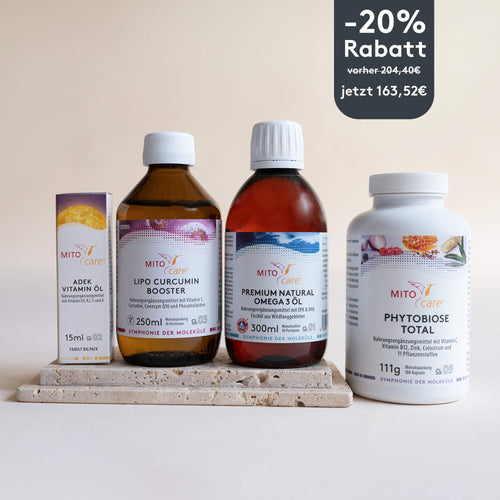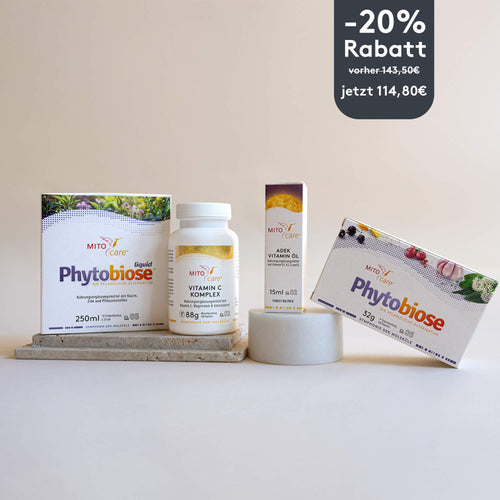Themen dieses Blogartikels:
Introduction
What vitamins are there and what do they do in your body?
Vitamins are vital substances for your body. You need them to maintain all your bodily functions, without them the body would not be able to perform or live. In this article, we'll start by introducing you to these essential substances and going into more detail about what functions vitamins have. For 13 vitamins, we even need two parts.
Here in part 1 you will find everything about the fat-soluble vitamins A, D, E and vitamin K2.
In part 2 we will continue with water-soluble vitamins. But now let's get started!
Here in part 1 you will find everything about the fat-soluble vitamins A, D, E and vitamin K2.
In part 2 we will continue with water-soluble vitamins. But now let's get started!
Knowledge for your ears!
No time to read? Here you can listen to Claire's article.
Table of Contents
• Why are vitamins so important for your body?
• What are fat-soluble vitamins?
• Vitamin A
• Vitamin D
• Vitamin E
• Vitamin K2
• What are fat-soluble vitamins?
• Vitamin A
• Vitamin D
• Vitamin E
• Vitamin K2
Why are vitamins so important for your body?
Vitamins are essential, which means that your body cannot produce them itself. So you have to get them from the outside with your food. The 13 vitamins are divided into fat-soluble and water-soluble vitamins, four are fat-soluble and nine are water-soluble.
Vitamin D is an exception, because your body can produce vitamin D itself - through the UV-B radiation of the sun.
Here's what you should know:
• Vitamins are vital for the body
• The majority of vitamins are essential, which means that they must be supplied from the outside
• Vitamins are divided into fat-soluble and water-soluble vitamins
• Vitamin D can be partially produced by the body itself through sun exposure
Although vitamins do not provide energy, humans are neither able to perform nor to live without them. Vitamins fulfill important tasks in the human body. They help in the utilization of food, they are involved in the formation of hormones, enzymes and blood cells, protect against harmful substances and control numerous biochemical processes in the body.
Furthermore, they are involved in the production of energy from carbohydrates, fats and proteins. They are also involved in building muscles and connective tissue and in the daily interaction of ligaments, tendons and muscles, and also contribute to the function of the nervous system.
Vitamin D is an exception, because your body can produce vitamin D itself - through the UV-B radiation of the sun.
Here's what you should know:
• Vitamins are vital for the body
• The majority of vitamins are essential, which means that they must be supplied from the outside
• Vitamins are divided into fat-soluble and water-soluble vitamins
• Vitamin D can be partially produced by the body itself through sun exposure
Although vitamins do not provide energy, humans are neither able to perform nor to live without them. Vitamins fulfill important tasks in the human body. They help in the utilization of food, they are involved in the formation of hormones, enzymes and blood cells, protect against harmful substances and control numerous biochemical processes in the body.
Furthermore, they are involved in the production of energy from carbohydrates, fats and proteins. They are also involved in building muscles and connective tissue and in the daily interaction of ligaments, tendons and muscles, and also contribute to the function of the nervous system.
What are fat-soluble vitamins?
Vitamins A, D, E and K belong to the group of fat-soluble vitamins. These vitamins can be stored in the body's fatty tissue. The body can only properly absorb and utilize fat-soluble vitamins if it is provided with fat from the diet.
Vitamins A, D, E and K2 are found in fats and oils, but also in many low-fat foods. Vitamin E is mainly found in vegetable oils.
Vitamins A, D, E and K2 are found in fats and oils, but also in many low-fat foods. Vitamin E is mainly found in vegetable oils.
Vitamin A
Previously associated primarily with visual function, we now know that vitamin A has many more functions. Together with vitamin D, among others, it also has a hand in gene regulation. Via its receptor, it can activate genes that have an influence on the immune system, growth and bone balance, for example.
What do we need vitamin A for?
Vitamin A, also called retinol, is therefore important for, among other things:
• Visual performance
• Function and structure of the skin and mucous membrane
• Protection of skin cells against DNA damage (e.g. caused by the sun)
• Blood formation; the incorporation of iron into hemoglobin
• Protein and fat metabolism in the liver
• The immune system
• Embryo development and cell specialization
What do we need vitamin A for?
Vitamin A, also called retinol, is therefore important for, among other things:
• Visual performance
• Function and structure of the skin and mucous membrane
• Protection of skin cells against DNA damage (e.g. caused by the sun)
• Blood formation; the incorporation of iron into hemoglobin
• Protein and fat metabolism in the liver
• The immune system
• Embryo development and cell specialization
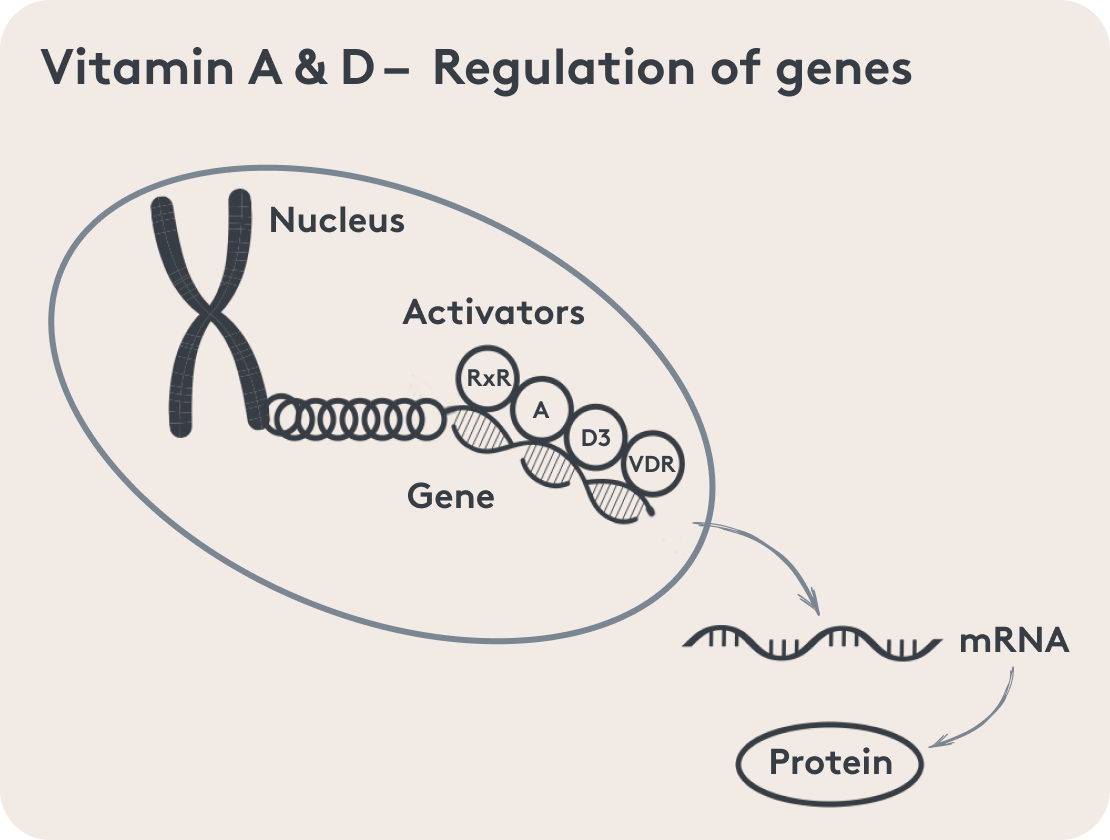

What happens with a vitamin A deficiency?
Vitamin A deficiency can lead to the following:
• Blindness, night blindness and visual disturbances (here there is a clear deficiency, this occurs especially in malnutrition as in third world countries)
• Hair loss and dryness of the skin, hair and mucous membranes
• Increased risk for infections
• Decreased fertility
• Fatigue and loss of appetite
• Growth disorders in children
• Impairment of sense of smell and touch
The precursors of vitamin A are carotenoids. They are colorants and are found in fruits or vegetables that are yellow, orange, dark green, or red in color: carrots, squash, corn, peppers, tomatoes, kale, spinach, broccoli, and apricots. Vitamin A, which has already been converted, is really only found in animal products because these animals have already converted the carotenoids. Sources are liver, eggs and dairy products.
The daily requirement is between 0.8 and 1 mg. The conversion rate of carotenoids is relatively low and additionally depends on genetic disposition. A supply of the finished vitamin A may therefore be recommended.
Many supplement options exist here that contain the active form of the vitamin.
Vitamin A deficiency can lead to the following:
• Blindness, night blindness and visual disturbances (here there is a clear deficiency, this occurs especially in malnutrition as in third world countries)
• Hair loss and dryness of the skin, hair and mucous membranes
• Increased risk for infections
• Decreased fertility
• Fatigue and loss of appetite
• Growth disorders in children
• Impairment of sense of smell and touch
The precursors of vitamin A are carotenoids. They are colorants and are found in fruits or vegetables that are yellow, orange, dark green, or red in color: carrots, squash, corn, peppers, tomatoes, kale, spinach, broccoli, and apricots. Vitamin A, which has already been converted, is really only found in animal products because these animals have already converted the carotenoids. Sources are liver, eggs and dairy products.
The daily requirement is between 0.8 and 1 mg. The conversion rate of carotenoids is relatively low and additionally depends on genetic disposition. A supply of the finished vitamin A may therefore be recommended.
Many supplement options exist here that contain the active form of the vitamin.
Vitamin D3
Vitamin D is certainly a sensitive topic. Considered by some as a remedy, by others condemned, it is probably the most discussed vitamin - or better hormone. It turns out that vitamin D belongs to the group of steroid hormone derivatives. This includes hormones such as cortisol, the stress hormone. Vitamin D thus has significantly more functions than that of mineralizing bones and regulating calcium levels. Above all, the regulatory function of the immune system is related to gene regulation, which we have already mentioned above.
What are the functions of vitamin D3?
Vitamin D, also called calciferol, is important for:
• Strong bones and muscles
• Teeth mineralization
• A normal calcium level
• The regulation of the immune system
• The cell division
• The differentiation of stem cells
• The maintenance of brain function
What are the symptoms of vitamin D deficiency?
• Vitamin D deficiency can lead to the following:
• Osteomalacia (softening bones), osteoporosis, joint and bone pain.
• Rickets, which is a bone disease in children
• Muscle cramps and weakness
• Fatigue and sleep disorders
• Depression
• Susceptibility to infections and inflammations
Vitamin D, also called calciferol, is important for:
• Strong bones and muscles
• Teeth mineralization
• A normal calcium level
• The regulation of the immune system
• The cell division
• The differentiation of stem cells
• The maintenance of brain function
What are the symptoms of vitamin D deficiency?
• Vitamin D deficiency can lead to the following:
• Osteomalacia (softening bones), osteoporosis, joint and bone pain.
• Rickets, which is a bone disease in children
• Muscle cramps and weakness
• Fatigue and sleep disorders
• Depression
• Susceptibility to infections and inflammations
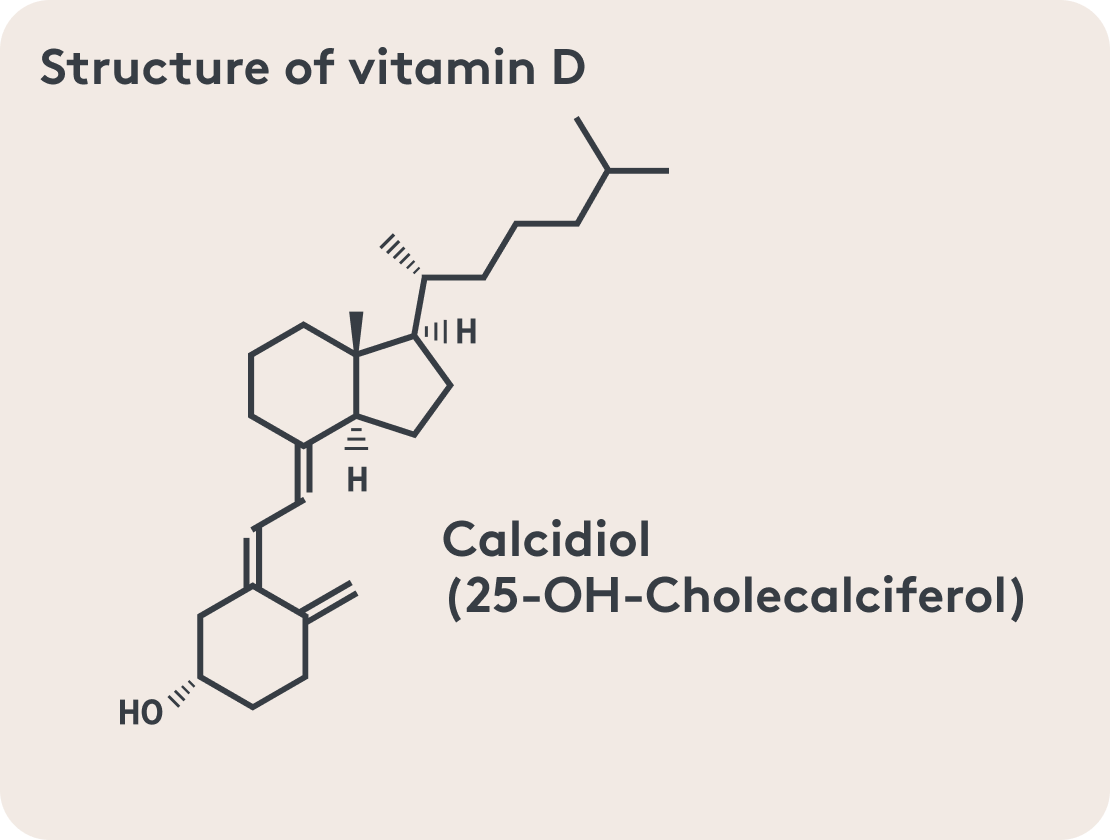

As mentioned above, vitamin D is special because the body can produce vitamin D itself. This works by means of exposure to sunlight. It should be noted here that this possibility also depends on how the sunlight falls, what time of year it is, how much skin is covered, and last but not least, the use of sunscreen. Sunscreens and the like block a large part of the UV-B radiation that is necessary for synthesis. Sun protection is nevertheless important, as it reduces the risk of developing skin cancer.
From the diet, vitamin D can be obtained largely from animal foods, especially oily fish, but plant foods, such as avocado, algae and mushrooms contain vitamin D. The daily vitamin D requirement is 20 ug, or 800 I.U.
Learn more about vitamin D and the immune system in this blog article:
From the diet, vitamin D can be obtained largely from animal foods, especially oily fish, but plant foods, such as avocado, algae and mushrooms contain vitamin D. The daily vitamin D requirement is 20 ug, or 800 I.U.
Learn more about vitamin D and the immune system in this blog article:
Vitamin E
Vitamin E is another fat-soluble vitamin. It is mainly known for its antioxidant function and is therefore often added to foods as a reducing agent. Antioxidants are substances with the ability to regenerate molecules. This happens when antioxidants donate an electron to those molecules in a reaction. This enables them to perform their function again, for example in a metabolic reaction. Mitochondria in particular need many antioxidants to be able to perform their function of producing energy.
Vitamin E, also known as tocopherol, is important for protecting the body's cells from free radicals, among other things. Vitamin E is a powerful antioxidant. This means that it protects against oxidative stress. Here, vitamin E is one of the few fat-soluble antioxidants. In addition, vitamin E is involved in fat metabolism.
Vitamin E, also known as tocopherol, is important for protecting the body's cells from free radicals, among other things. Vitamin E is a powerful antioxidant. This means that it protects against oxidative stress. Here, vitamin E is one of the few fat-soluble antioxidants. In addition, vitamin E is involved in fat metabolism.
Vitamin E deficiency, on the other hand, leads to typical manifestations of oxidative stress.
This can include, for example:
• Weakness in performance and concentration
• Dry, wrinkled skin
• Fatigue
• Diseases such as neurodermatitis and arteriosclerosis (as these are associated with an increased number of oxidized molecules)
We can absorb vitamin E through food. It is found in vegetable seeds, nuts and oils as well as in peppers, eggs and whole grain products. The daily requirement is 11-15mg.
This can include, for example:
• Weakness in performance and concentration
• Dry, wrinkled skin
• Fatigue
• Diseases such as neurodermatitis and arteriosclerosis (as these are associated with an increased number of oxidized molecules)
We can absorb vitamin E through food. It is found in vegetable seeds, nuts and oils as well as in peppers, eggs and whole grain products. The daily requirement is 11-15mg.
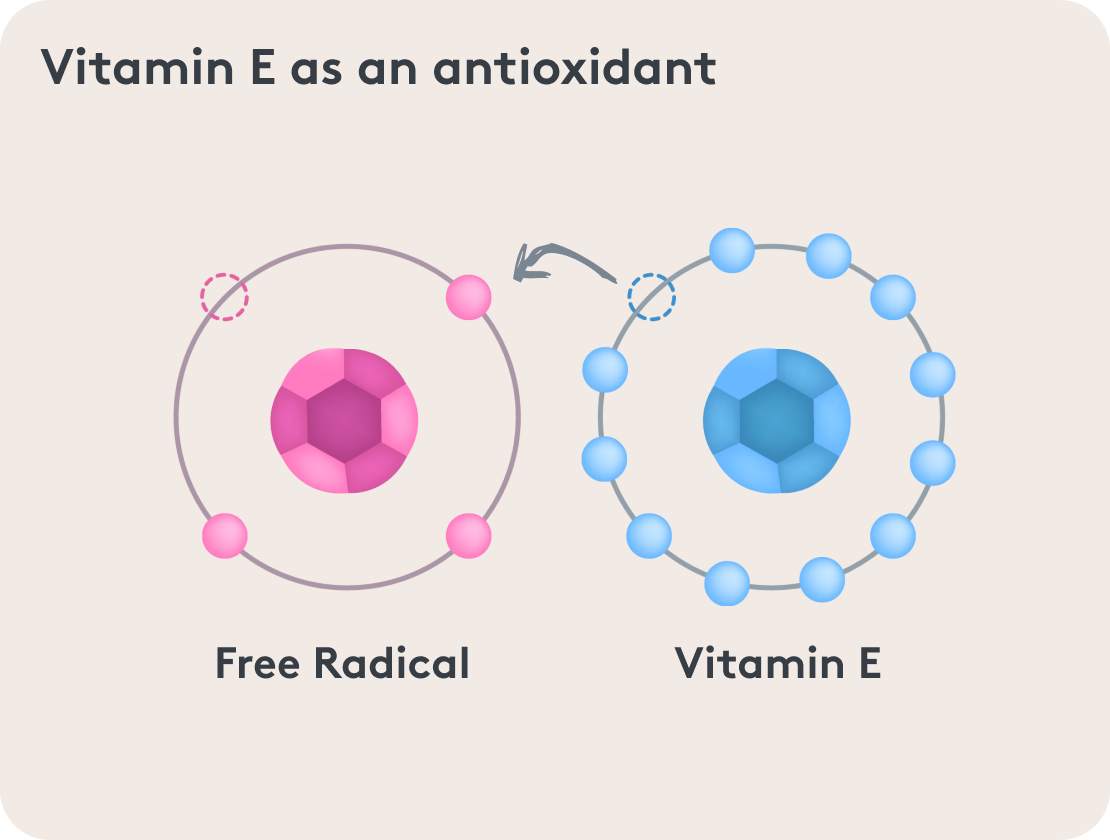

Vitamin K2
This vitamin is often swept under the table or even attempted to be inhibited. Vitamin K antagonists are used in medicine to prevent blood clotting in patients with existing atherosclerosis and thrombosis. Physiologically, vitamin K is relevant in blood clotting, among other things, which is actually not bad. In the event of an injury, the wound must be closed quickly. However, in the case of excessively active clotting, the risk of thrombosis is increased.

Vitamins Part 2 - Water Soluble Vitamins
Stay tuned for part 2!/Here you can get to part 2!
Here we explain everything you need to know about the water-soluble vitamins. These are the important B vitamins and vitamin C. Learn more about vitamins in part 2.


